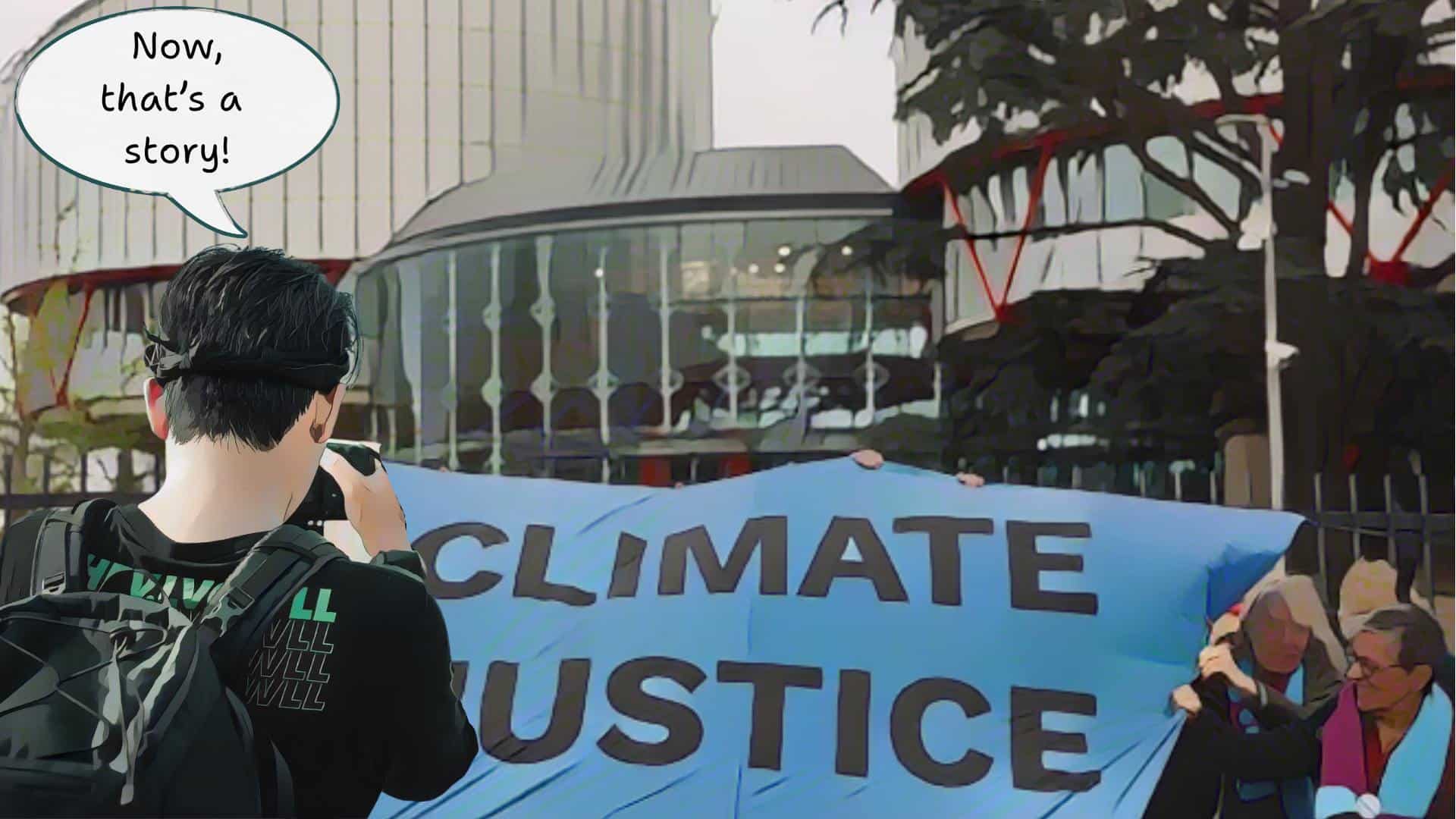Not everything that happens is news. To entice an editor to publish or air your story, it needs to interest readers or listeners. But there are ways to tell if a story will be a good one.

A teen reporter decides a protest about climate change is newsworthy. (Illustration by News Decoder)
Journalism and activism can be powerful tools for change. Each week in our News Decoder Top Tips, we share advice from reporters, editors, writers and master storytellers on ways to better engage audiences and spur change. In this Top Tip, Sabīne Bērziņa, News Decoder’s user experience manager for its Promoting Media Literacy & Youth Citizen Journalism through Mobile Stories project, suggests ways young people can find stories for publication.
Top Tips are part of our open access learning resources. You can find more of our learning resources here. And learn how you can incorporate our resources and services into your classroom or educational program or by forming a News Decoder Club in your school.
You are new to journalism and ready to pitch a story to a news site or publication. But how to find a story idea that will interest an editor? You don’t have to interview famous politicians or celebrities to get published. It is all about finding something that will interest readers.
“News stories are all around you,” said Milja Ångerman, a journalist at a Finnish local newspaper Vasabladet. “You just have to learn how to spot them.”
Ångerman is a video instructor for Mobile Stories — an innovative journalism education and publishing platform used in schools. News Decoder leads the educational content development in English as a part of our mission to inspire young people to take part in global debates.
And a great way to be part of a global debate is to find stories that spark conversations. That’s easier than you might think.
To find stories, journalists keep their eyes and ears open to see what people care about in their community. They look for things out of the ordinary that sparks their curiosity. Then they ask questions.
Storytelling starts with an idea.
In Latvia where I live a storm caused flooding in several cities, even though Latvia is a country with few extreme weather events.
It got me asking a number of questions: Is this happening because of climate change? Will it happen more? What will the future look like in a country that is not used to such extremes and unprepared for them?
This is the type of problem people face all over the world. You can likely find similar stories in your region.
Once you have questions you need to find someone who can answer them. For a story about extreme weather, talk to an expert. How are people dealing with the damage to their homes? Are they receiving support?
Then talk to neighbours. Are there any small business owners who struggle to make ends meet because of the damage to their shops or cafes? Go to a street with several shops and ask people who work there. Journalism will open doors for you to learn more about the people around you.
Spot the story in what people tell you.
You spotted something out of the ordinary and formed questions. But your story will come out of the answers people give you. The story you initially spot and the questions you ask are the starting points. Only when you talk to people do you find new information that will form the basis of a unique story.
In your interviews, pay attention to things that you think are unjust or that have caused friction between people. “Injustices in society or things that bother you in your city can always be a news story,” Ångerman said. Is there something that makes you ask in frustration, “why is this happening?”
But it doesn’t have to be something extreme or negative. Everybody can be interesting, Ångerman said. You might have classmates, friends or teachers with unusual hobbies, professions or life stories. Ångerman has written about people with unusual pets, beautiful homes and people working to uplift others.
News Decoder has published articles by high school students across the globe about all kinds of topics: people who rescue mistreated dogs, how the war in Ukraine affects French bakers and how scientists use artificial intelligence to study whales.
Find a global angle.
If you write for a school or local paper and found something interesting in your community you might have found your story. However, News Decoder wants you to take it a step further.
We seek to publish stories of global interest. That doesn’t mean that you somehow have to know and describe what’s happening everywhere.
It simply means that you ask yourself: could this be relatable to someone in another country or continent?
While an article about frustrating roadwork in your town might not be right for News Decoder, there are ways to see it from a global perspective.
Are poor roads a problem only in your area or do we see that in other countries as well? Do wealthy areas tend to have better roads where you are and is that a problem elsewhere? Does it make it more difficult for people to find jobs and support their families and is this a problem we see in other countries as well? Can you find an expert who researches this topic at a university or research institution who could help you see it from a global perspective?
One student recently wrote a story for News Decoder about the struggles of asylum seekers in her city and found that there are 43.4 million refugees around the world, according to the United Nations Refugee Agency. Chances are that there are some in your hometown too and they experience similar difficulties.
Another student wrote about the concentration of food markets in wealthier neighborhoods and how that makes things difficult for poor people to provide nutritious food for their children. He found similar problems in the countries of South Africa, Ghana and Tanzania. A student concerned about a lack of sex education in high schools found that UNESCO had identified this as a global problem.
Work with your editor
If you do have a topic you want to explore but aren’t sure if it has a global angle, don’t let it stop you. News Decoder Educational News Director Marcy Burstiner said great journalism comes out of a collaborative process.
“That’s where editors come in,” Burstiner said. “So many times I’ve had reporters suggest a story idea thinking that no one would be interested in it and they are surprised at how excited I get. Or what they are thinking about might be super-local but I can help them see how it could be relevant to more people in more places.”
Editors often look for stories that they determine are “newsworthy.” But there is no fixed formula for what makes something newsworthy but there are common elements.
Relevancy. Think about whether your story is relevant to others. Journalists write to inform. Think about your audience and why the problem you report or the trend that is happening concerns them.
The unusual and surprising. A kangaroo in Australia is pretty common but one hopping down a road in the U.S. state of Texas? Giant redwood trees are all over Northern California but did you know that people in England and Ireland are trying to create redwood forests to fight climate change?
Timeliness. People are interested in something that just happened or is about to happen. You might want to write about a problem that has been going on for years. Is there something related to that that is about to happen — a new law that will be passed somewhere, an anniversary of a disaster that will take place, a protest or rally that is scheduled.
Impact. Are there many people affected? The fact that there were floods in Latvia is yesterday’s story. But what is the ongoing effect of it? How wide an area was affected? How much money did it take to repair the damage? These questions could be relevant for a long time.
“The way to know if a story is interesting enough to pursue is talk to people about it,” Burstiner said. “If you find people want to talk about it and want to learn more, then you know you hit on a story worth pursuing. News stories should spark conversations. If the very topic sparks conversation you are already there.”
Three questions to consider:
- What are editors looking for when they consider a story pitch?
- How can you make a story about something happening in your area relevant to someone in another place?
- Can you think of a good story idea about something happening in your area?

Sabīne Bērziņa is News Decoder’s user experience manager for its Promoting Media Literacy & Youth Citizen Journalism through Mobile Stories project. She is a media literacy curriculum and tool developer, as well as a journalist with nine years of experience in the media industry. She lives and works in Latvia.

What are editors looking for when they consider a story pitch?
A story that sparks conversation.
How can you make a story about something happening in your area relevant to someone in another place?
Yes, stating common issues, as the way the Government deals with it, How it affects people’s emotions and thinkings, etc.
Can you think of a good story idea about something happening in your area?
The wrong utilization of the Budget. Or the not utilization of the Budget assigned.
Hi, Eduardo! Thanks for reading. It’s nice to hear your thoughts on this. I’m wondering what kinds of stories do you think are more likely to spark conversations? People love to talk about conflicts, sensations and unusual stories, but what they need to know about can be often be something that’s difficult and boring. Do you think there’s a contradiction there or does it all depend on how well the journalist wrote the story? / Sabīne Bērziņa, the author